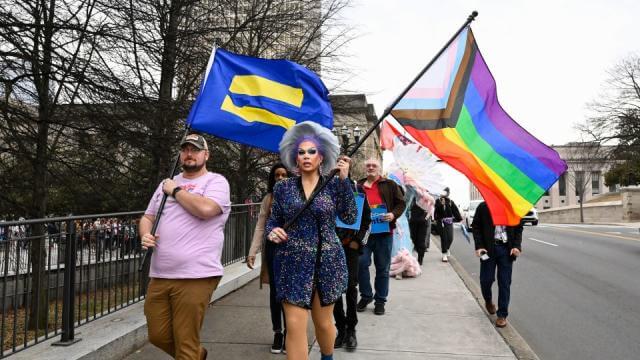Trump-Appointed Judge Rejects Tennessee Anti-Drag Law as Unconstitutional
U.S. District Judge Thomas Parker, a Trump appointee, has declared Tennessee’s groundbreaking law aimed at imposing strict regulations on drag shows as unconstitutional.
The judge ruled that the anti-drag law was both excessively vague and overbroad, raising concerns about discriminatory enforcement.
Judge Parker concluded that the law’s language lacked clarity and had the potential to be enforced in a discriminatory manner.
He emphasized the distinction between material that is considered “obscene” in the vernacular versus under the law.
Parker highlighted that sexually explicit but non-obscene speech should not receive less protection than political, artistic, or scientific speech.
The law sought to prohibit adult cabaret performances on public property or in places where minors might be present.
Violators could face misdemeanor or felony charges for repeat offenses. However, the law faced significant criticism for its broad application.
Potentially penalizing performers engaged in harmless acts such as impersonating iconic figures like Elvis Presley.
Friends of George’s, an LGBTQ+ theater company based in Memphis, challenged the law. Arguing that it would adversely affect their drag-centric performances without age restrictions.
The company expressed joy over the ruling, stating that it represented a triumph against hate and affirmed their First Amendment rights as artists.
Republican Senate Majority Leader Jack Johnson, one of the main sponsors of the anti-drag law, expressed disappointment with the ruling. Asserting that it favored exposing children to sexual entertainment.
He called for the state’s attorney general to appeal the decision. However, the plaintiffs had previously dismissed Governor Bill Lee and Attorney General Jonathan Skrmetti from the case.
Background on the Anti-Drag Law

The Tennessee Legislature, dominated by Republicans, passed the anti-drag law earlier this year. Though the word “drag” did not appear in the statute, the law broadened the definition of adult cabaret and classified “male or female impersonators” as a form of adult cabaret.
The law temporarily blocked by the federal judge after the legal challenge in March, preventing its enforcement.
Judge Parker pointed out that the sponsor of the law, Republican state Rep. Chris Todd, had previously attempted to block a drag show in his district.
This incident, coupled with other evidence, led the judge to believe that the anti-drag law aimed at hindering drag shows, regardless of their potential impact on minors.
The anti-drag law is the second major proposal targeting LGBTQ+ individuals passed by Tennessee lawmakers this year.
Governor Bill Lee signed legislation banning most gender-affirming care, which is currently facing legal challenges.
In summary, a federal judge appointed by Donald Trump has declared Tennessee’s anti-drag law unconstitutional due to its vagueness and potential for discriminatory enforcement.
The ruling is seen as a victory for LGBTQ+ rights and affirms artists’ First Amendment protections.
This decision adds to the ongoing controversy surrounding legislation targeting the LGBTQ+ community in Tennessee, as lawmakers face legal challenges and criticism for the impact of their proposals.





